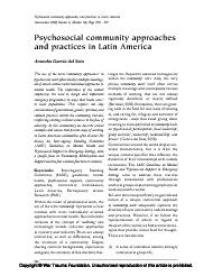Psychosocial community approaches and practices in Latin America
The use of the term ‘community approaches’ in psychosocial work often involves multiple meanings, all of which contrast with individual approaches to mental health. The importance of the context emphasizes the need to design and implement emergency programmes in ways that ‘make sense’ to local populations. This requires not only consideration of generational, gender, spiritual, and cultural practices within the community, but also reinforcing existing resilient resources in the face of adversity. In this commentary we describe several examples and sources that present ways of working in Latin American communities after disaster. We discuss the Inter-Agency Standing Committee (IASC) Guidelines on Mental Health and Psychosocial Support in Emergency Settings, with a specific focus on ‘Community Mobilization and Support’and the four common functions it contains.
Geachte bezoeker,
De informatie die u nu opvraagt, kan door psychotraumanet niet aan u worden getoond. Dit kan verschillende redenen hebben,
waarvan (bescherming van het) auteursrecht de meeste voorkomende is. Wanneer het mogelijk is om u door te verwijzen naar de bron
van deze informatie, dan ziet u hier onder een link naar die plek.
Als er geen link staat, kunt u contact opnemen met de bibliotheek,
die u verder op weg kan helpen.
Met vriendelijke groet,
Het psychotraumanet-team.
Reference:
Arancha Garcia del Soto | 2008
In: Intervention: the international journal of mental health, psychosocial work and counselling in areas of armed conflict, ISSN 1571-8883 | 6 | 3-4 | 228-231
http://www.interventionjournal.com/sites/default/files/6.3_04_GarciaDelSoto.pdf
In: Intervention: the international journal of mental health, psychosocial work and counselling in areas of armed conflict, ISSN 1571-8883 | 6 | 3-4 | 228-231
http://www.interventionjournal.com/sites/default/files/6.3_04_GarciaDelSoto.pdf


